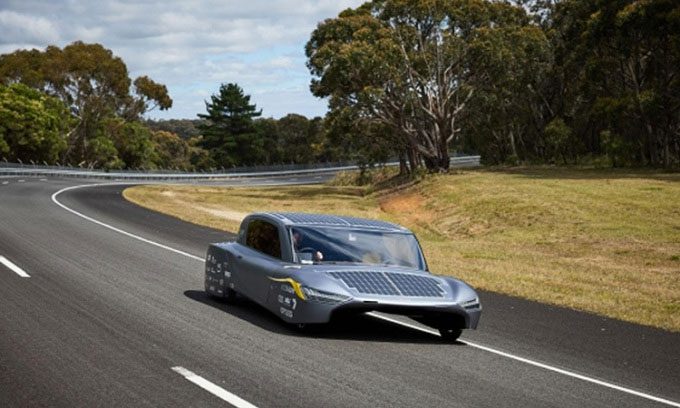Sunswift 7 Solar Car Completes 1,000 km in Under 12 Hours, Averaging Nearly 85 km/h.
In a recent test, the Sunswift 7 solar car from The University of New South Wales Sydney (UNSW) traveled 1,000 km in less than 12 hours on a single charge, as reported by New Atlas on December 19. The event took place at the Highway Circuit testing track at the Australian Automotive Research Centre, where Sunswift 7 completed 240 laps.

Sunswift 7 solar car on the road. (Photo: Richard Freeman/UNSW)
Engineers at UNSW began developing solar cars in 1996 and have set multiple speed records with electric vehicles in recent years. Sunswift 7 is UNSW’s latest solar vehicle, weighing only 500 kg, which is about a quarter of the weight of a Tesla.
To reduce the weight of the car, the engineering team had to eliminate features such as air conditioning, ABS brakes, airbags, windshield wipers, and many other components. Instead, they focused on aerodynamic efficiency and rolling resistance. While the Tesla Model S has a drag coefficient of 0.208, Sunswift 7 boasts a remarkable drag coefficient of just 0.095.
The engineering team spent two years developing Sunswift 7 with the aim of setting a Guinness World Record for the fastest solar electric car to travel 1,000 km on a single charge. However, the journey was not without challenges. They encountered battery issues and flat tires, and driver changes occurred every few hours. Ultimately, the vehicle completed the 1,000 km distance in 11 hours, 53 minutes, and 32 seconds, averaging nearly 85 km/h. The team is awaiting official confirmation of the time and remote measurement data from the vehicle to obtain Guinness World Record certification.
“During the record journey, the energy consumption was 3.8 kWh/100 km, while the most efficient electric vehicles on the road today only achieve about 15 kWh/100 km, with an average of around 20 kWh/100 km,” stated Professor Richard Hopkins, the lead engineer.
“Sunswift 7 is not a model that can be mass-produced in the future, as we have traded off comfort and convenience, and the costs are quite high. However, we have demonstrated that it is possible to create cars that are more efficient, sustainable, and environmentally friendly,” Hopkins added.


















































